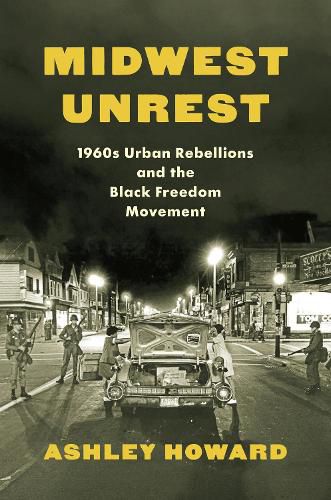Readings Newsletter
Become a Readings Member to make your shopping experience even easier.
Sign in or sign up for free!
You’re not far away from qualifying for FREE standard shipping within Australia
You’ve qualified for FREE standard shipping within Australia
The cart is loading…






In the nation's so-called heartland, racism is sometimes subtler than in other parts of the country but just as insidious. When Black communities across America went up in flames in the 1960s, Midwest cities, where racial inequity was endemic, were among those most likely to burn. Midwest Unrest explores those rebellions, paying particular attention to the ways that region, race, class, and gender all played critical and often overlapping roles in shaping Black people's resistance to racialized oppression.
Focusing on the uprisings in three midsize Midwestern cities-Cincinnati, Ohio; Omaha, Nebraska; and Milwaukee, Wisconsin-Ashley Howard argues that urban rebellions were a working-class response to the failure of traditional civil rights activism and growing fissures between the Black working and middle classes. Utilizing arrest records, Kerner Commission documents, and author-conducted oral history interviews, Howard registers the significant impact the rebellions had in transforming the consciousness of African Americans and in altering the relationship between Black urban communities and the state. Specifically, multiple parties, including municipal governments, city residents, and most importantly rebels, wielded urban revolt as a political tool to achieve their own objectives. Revealing a new dimension of the Black Freedom Movement, Howard moves the understanding of these disturbances from aberrant acts of violence to historically contingent acts of resistance, highlighting the coeval nature between organized protests and violent outbursts.
$9.00 standard shipping within Australia
FREE standard shipping within Australia for orders over $100.00
Express & International shipping calculated at checkout
In the nation's so-called heartland, racism is sometimes subtler than in other parts of the country but just as insidious. When Black communities across America went up in flames in the 1960s, Midwest cities, where racial inequity was endemic, were among those most likely to burn. Midwest Unrest explores those rebellions, paying particular attention to the ways that region, race, class, and gender all played critical and often overlapping roles in shaping Black people's resistance to racialized oppression.
Focusing on the uprisings in three midsize Midwestern cities-Cincinnati, Ohio; Omaha, Nebraska; and Milwaukee, Wisconsin-Ashley Howard argues that urban rebellions were a working-class response to the failure of traditional civil rights activism and growing fissures between the Black working and middle classes. Utilizing arrest records, Kerner Commission documents, and author-conducted oral history interviews, Howard registers the significant impact the rebellions had in transforming the consciousness of African Americans and in altering the relationship between Black urban communities and the state. Specifically, multiple parties, including municipal governments, city residents, and most importantly rebels, wielded urban revolt as a political tool to achieve their own objectives. Revealing a new dimension of the Black Freedom Movement, Howard moves the understanding of these disturbances from aberrant acts of violence to historically contingent acts of resistance, highlighting the coeval nature between organized protests and violent outbursts.